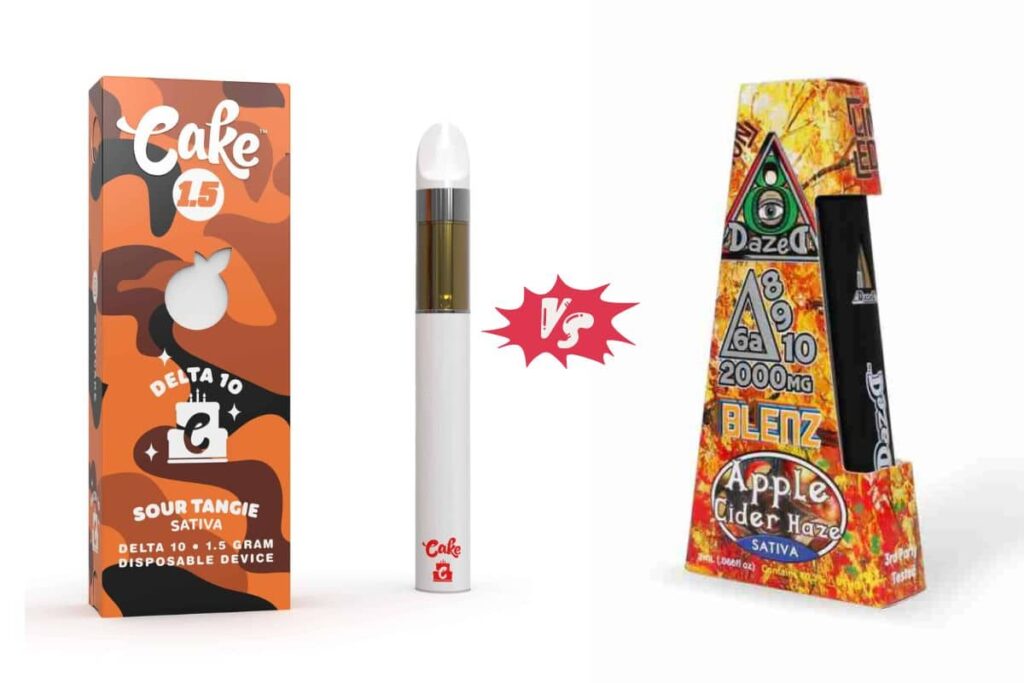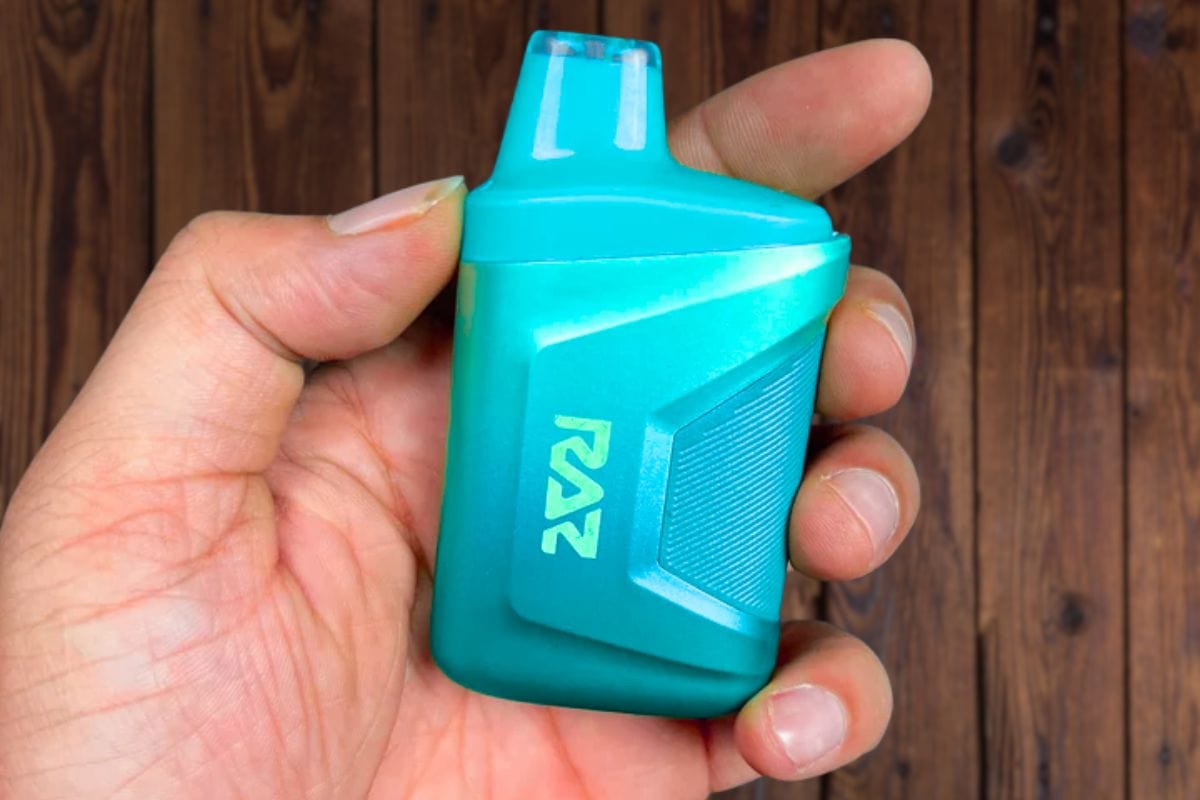Delta 8 Side Effects: An Informed Guide for Consumers
Delta-8 THC has emerged as the newest sensation, capturing the interest of many with effects akin to its more familiar relative, Delta-9 THC. The interesting aspect is that it originates from both hemp and marijuana. This minor cannabinoid is generating buzz for its unique impact. Explore and find out why Delta-8 THC might just be the unexpected hero from the world of cannabis that you didn’t know you were missing.
However, Delta-8 THC is less potent and tends to produce fewer side effects, making it an attractive alternative for those seeking the benefits of THC without the intense high. As the popularity of Delta-8 THC products continues to grow, understanding its side effects and potential risks becomes essential for both users and professionals in the cannabis industry.
- Key Takeaways
- Delta-8 THC: A Brief Overview
- Side Effects of Delta-8 THC
- Comparing Delta-8 and Delta-9 THC
- Safety and Risks of Delta-8 Products
- Legal Status and Regulation
- Delta-8 THC and Public Health
- Potential Benefits and Medical Uses
- Interaction with Cannabinoid Receptors
- Delta-8 THC and Drug Tests
- Considerations for Use and Consumption
- Frequently Asked Questions
- Footnotes
While Delta-8 THC offers some potential benefits, users may still experience side effects, such as drowsiness, dry mouth, and mild anxiety. These side effects vary from person to person, depending on factors such as dosage, individual tolerance, and the method of consumption.
Comparing Delta-8 THC to Delta-9 THC, the former appears to provide a more manageable experience with fewer drawbacks. However, it is important to note that research on Delta-8 THC is still relatively limited, and further studies on its impact on public health and long-term effects are needed.
Key Takeaways
- Delta-8 THC is a less potent cannabinoid found in hemp and cannabis, known for producing fewer side effects compared to Delta-9 THC.
- Common side effects include drowsiness, dry mouth, and mild anxiety, but they may vary depending on dosage and individual factors.
- Further research is necessary to better understand Delta-8 THC’s long-term effects, safety, and potential benefits.
Delta-8 THC: A Brief Overview
Delta-8 THC is a minor cannabinoid found in both cannabis and hemp-derived products. It is an isomer of the more well-known delta-9 THC, which is the primary psychoactive component in marijuana. Delta-8 THC has gained popularity in recent years due to its potential benefits and seemingly milder effects compared to its delta-9 counterpart.
While delta-9 THC is typically associated with the traditional “high” feeling, delta-8 THC is said to provide a more moderate, clear-headed experience. Users report experiencing less anxiety and paranoia with delta-8 THC compared to delta-9 THC. However, it should be noted that delta-8 THC can still cause psychoactive effects, albeit generally less intense.
One interesting aspect of delta-8 THC is its legal status in the United States. Although delta-9 THC is federally illegal, delta-8 THC can be derived from hemp, which is legal under the 2018 Farm Bill. This has led to a surge in delta-8 THC products on the market, particularly in states where marijuana remains illegal.
Researchers are beginning to study the potential therapeutic benefits of delta-8 THC, with some preliminary evidence suggesting that it could have anti-nausea, appetite-stimulating, and pain-relieving properties. However, it’s important to note that research on delta-8 THC is still in its early stages, and more studies are needed to confirm these findings.
Despite its growing popularity, delta-8 THC is not without its potential side effects. Some users have reported experiencing dizziness, dry mouth, mild paranoia, and sedation after consuming delta-8 THC products. It’s crucial for consumers to be educated about the potential side effects of delta-8 THC and to start with a low dose to gauge their individual response.
In conclusion, delta-8 THC is a cannabinoid with a growing presence in the cannabis and hemp markets. Its potential benefits, milder side effects compared to delta-9 THC, and legal status in many areas make it an attractive option for some users. However, further research is needed to fully understand its therapeutic potential and safety profile.
Side Effects of Delta-8 THC

Physical Side Effects
Delta-8 THC, a close relative of the more popular Delta-9 THC, has been known to cause some physical side effects. While many users report less intense effects compared to Delta-9 THC, there are still potential side effects to consider. Commonly reported physical side effects include dry mouth, which may lead to discomfort and increased thirst. Users may also experience nausea and, in some cases, vomiting, particularly when consuming high doses.
Delta-8 THC can also have an impact on eating habits, potentially increasing or decreasing appetite. This might lead to undesired weight fluctuations for some users. Additionally, some people may experience dizziness or impaired coordination after using Delta-8 THC, which can create a risk of accidents or injuries. In rare cases, Delta-8 THC may even cause tremors or temporary loss of consciousness. If any of these side effects are severe or persistent, it’s crucial to seek medical attention.
Mental Side Effects
While Delta-8 THC is known for producing a mild high in comparison to Delta-9 THC, it can still cause some mental side effects. One of the most notable mental side effects is the potential for hallucinations. While less common than with Delta-9 THC, this may occur in some users, especially at higher doses. Other potential mental side effects include temporary memory impairment, difficulty concentrating, and increased anxiety.
In conclusion, while Delta-8 THC often has milder effects compared to its more popular counterpart, it’s important to be aware of its potential physical and mental side effects. As with any substance, individual experiences may vary, and it’s crucial to use Delta-8 THC responsibly and in moderation. Always consult with a healthcare professional if you’re unsure about using Delta-8 THC or if you experience any severe or long-lasting side effects.
Comparing Delta-8 and Delta-9 THC
Delta-8 THC and Delta-9 THC are both cannabinoids derived from the cannabis plant, with distinct differences in their chemical structures and effects. While Delta-9 THC is more widely known for its psychoactive properties, Delta-8 THC is gaining popularity due to its unique combination of effects that are often described as less potent and causing fewer adverse reactions.
The chemical structure of Delta-8 THC and Delta-9 THC is quite similar, with only a slight difference in the positioning of a double bond. This small molecular difference plays a significant role in the way these cannabinoids interact with the body’s endocannabinoid system. Delta-8 THC is known for its lower potency and milder psychoactive effects compared to Delta-9 THC. Users of Delta-8 THC often report fewer incidences of anxiety and paranoia, which are commonly associated with the use of Delta-9 THC.

When it comes to the comparisons with CBD, another well-known cannabinoid, Delta-8 THC shares some similarities in its therapeutic properties. Both CBD and Delta-8 THC are known to possess anti-inflammatory, analgesic, and neuroprotective properties. However, unlike CBD, Delta-8 THC does produce psychoactive effects, albeit to a lesser degree than Delta-9 THC.
In terms of consumption, Delta-8 THC can be ingested orally or inhaled, similar to Delta-9 THC and CBD. It’s important to note that the concentration of Delta-8 THC in cannabis plants is typically much lower than the concentrations of Delta-9 THC. As a result, Delta-8 THC is often extracted from hemp or selectively bred strains of cannabis with higher concentrations of this cannabinoid.
Research on Delta-8 THC is still relatively limited, but studies comparing its effects to Delta-9 THC have shown promising results. For instance, a study comparing the oral and intravenous administration of Delta-8 THC and Delta-9 THC in humans found that Delta-8 THC had lower psychoactive potency. Additionally, another survey indicated that Delta-8 THC users experience fewer adverse effects and a smoother overall experience when compared to Delta-9 THC.
While more research is needed to fully understand the differences and potential therapeutic benefits of Delta-8 THC, its initial reputation as a milder and less adverse alternative to Delta-9 THC is gaining traction among users and researchers alike.
Safety and Risks of Delta-8 Products
Delta-8 THC is a lesser-known cannabinoid found in cannabis that has been gaining interest due to its reported medical benefits and lower risk of adverse effects compared to its more famous counterpart, Delta-9 THC. However, concerns have been raised about the safety and regulation of Delta-8 THC products in various forms.
Gummies, Edibles, Oils, and Tinctures
While some users have reported a more relaxed and less anxious experience with Delta-8 THC, it is still a psychoactive compound that can cause impairment and general safety concerns. These products, such as gummies and edibles, are easy to consume in large quantities, which may lead to unintentional overconsumption. This may result in severe side effects for certain individuals, such as a two-year-old girl who ingested nine Delta-8 gummies.

Oils and tinctures, while offering a different method of consumption, still pose potential risks if not taken responsibly. Users should carefully follow dosing instructions provided by manufacturers and the FDA to minimize risks related to accidental overconsumption or misunderstanding of the product potency.
Vapes and Joints
Inhaled forms of Delta-8 THC, such as vapes and joints, have become popular for their rapid onset and convenient use. However, these products present some respiratory risks, particularly for users with pre-existing lung conditions. Additionally, their widespread availability and lack of regulation may contribute to a higher potential for impurities, contaminants, and health risks.
Potential Contaminants
Due to the largely unregulated nature of Delta-8 THC production, some products may contain unknown and potentially hazardous contaminants. Examples of potential contaminants include residual solvents, pesticides, heavy metals, and synthetic cannabinoids. While further research is necessary to determine the long-term effects of these substances, consumers should opt for lab-tested and verified products to minimize potential exposure to toxic substances.
Packaging and Labeling
Another concern with Delta-8 THC products is the inconsistent or vague labeling practices. Proper labeling should include the concentration of Delta-8 THC, along with the recommended dosage and serving size information. Unfortunately, some products on the market do not provide this essential information, leading to potential confusion or overconsumption. Consumers should be cautious when purchasing Delta-8 THC products to ensure they are from reputable sources with transparent packaging and labeling practices.
Legal Status and Regulation
Delta-8 THC has become increasingly popular due to its perceived milder psychoactive effects compared to Delta-9 THC. However, its legal status and regulation remain somewhat ambiguous and vary across different jurisdictions.

The 2018 Farm Bill legalized hemp and its derivatives, including certain cannabinoids like CBD, as long as they contain no more than 0.3% Delta-9 THC. This has led some to argue that Delta-8 THC is federally legal since it can be derived from hemp. However, the Drug Enforcement Administration (DEA) has stated that synthetically produced Delta-8 THC remains a Schedule I substance, regardless of its source1.
Several states in the US have taken matters into their own hands, regulating the sale of Delta-8 THC similarly to Delta-9 THC2. This has created a patchwork of regulations across the nation, making it difficult for businesses and consumers to navigate the legal landscape.
As Delta-8 THC continues to gain popularity, calls for clearer regulatory guidelines are growing. Some experts argue that more research is needed to understand the potential side effects and long-term health implications of Delta-8 THC use3. In the meantime, businesses selling Delta-8 THC products will need to stay informed about the evolving legal landscape and ensure compliance with both federal and state regulations.
Delta-8 THC and Public Health
Delta-8 THC has been gaining popularity due to its potential benefits and milder psychoactive effects compared to Delta-9 THC, the primary psychoactive component in cannabis. However, it is essential to understand the potential side effects and impact of Delta-8 THC on public health.
Many users have reported experiencing less anxiety and paranoia from Delta-8 THC compared to Delta-9 THC. This reduced anxiety might make Delta-8 THC appealing to those who want the therapeutic benefits of cannabis without the overwhelming psychoactive effects. Additionally, some individuals find that Delta-8 THC provides a more clear-headed and focused high, which may be beneficial for stress relief and relaxation.
Despite its potential benefits, Delta-8 THC is not without risks. Poison control centers have reported an increase in calls related to Delta-8 THC exposure, including cases of accidental ingestion and adverse reactions. It is crucial for people to be cautious when using Delta-8 THC products, especially for those with little experience or a low tolerance for cannabis.
As Delta-8 THC is still relatively new to the market, more research is needed to fully understand its impact on public health and safety. This includes studying its long-term effects, interactions with other medications, and potential for addiction and withdrawal symptoms. In the meantime, public education and increased awareness of Delta-8 THC and its potential side effects are necessary to promote responsible use and minimize harm.
Potential Benefits and Medical Uses
Delta-8 THC has been gaining attention for its potential benefits and medical uses. This cannabinoid interacts with the endocannabinoid system in our bodies, which plays a vital role in regulating various physiological processes such as inflammation, pain sensation, and mood.
One of the potential advantages of Delta-8 THC over its more well-known cousin, Delta-9 THC, is its milder psychoactive effects. This characteristic makes it more appealing for medical use, as it may provide similar benefits with fewer adverse effects. According to research, Delta-8 THC may be equally effective for the desired purposes of cannabis use and lower in undesirable side effects.

Several medical conditions may benefit from Delta-8 THC use. For example, it has been suggested that Delta-8 THC could help alleviate chronic pain and inflammation. This would make it a viable option for those seeking pain relief without the intense psychoactive properties of Delta-9 THC.
Moreover, Delta-8 THC has also shown potential as a natural remedy for depression. Its milder psychoactive effects make it more suitable for those looking to improve their mood without experiencing the possible negative side effects associated with Delta-9 THC use.
In conclusion, Delta-8 THC offers numerous potential benefits and medical uses, particularly for individuals seeking a gentler alternative to traditional cannabis products. The cannabinoid’s ability to interact with the endocannabinoid system, providing relief for various medical conditions while minimizing adverse effects, makes it an appealing option for many patients. Further research is needed to confirm its long-term efficacy and safety in treating a wide range of medical conditions, but the early results are promising.
Interaction with Cannabinoid Receptors
Delta 8-THC, a less potent cannabinoid compared to its more well-known counterpart Delta 9-THC, interacts with cannabinoid receptors in the body, specifically the CB1 and CB2 receptors. These receptors are part of the endocannabinoid system, which plays a role in various physiological processes like mood regulation, pain perception, and immune system function.
When Delta 8-THC binds with CB1 receptors, it produces psychoactive effects similar to those associated with Delta 9-THC, albeit milder. This interaction can lead to euphoria, altered mood, and altered perception, which some people find less intoxicating and more manageable than the stronger psychoactive effects caused by Delta 9-THC. Binding with CB2 receptors, on the other hand, can influence the body’s immune system response and has potential therapeutic effects.
The efficacy and affinity of Delta 8-THC for cannabinoid receptors can be influenced by the chemical structure of its side-chain analogues, according to a study. Changes in the side-chain may have a significant impact on the potency and overall effects of Delta 8-THC.
It is important to note that the interaction between Delta 8-THC and other cannabinoids, as well as possible synergistic effects between cannabinoid and opioid analgesics, may also contribute to the perceived side effects and potential therapeutic benefits. This complex interplay has been demonstrated in a study on the combination of Delta 9-THC and opioids and may also apply to Delta 8-THC.
In summary, the interaction between Delta 8-THC and cannabinoid receptors in the human body can produce a variety of effects including psychoactive and therapeutic outcomes. However, it is crucial for individuals consuming Delta 8-THC to be aware of these effects and to use the compound responsibly.
Delta-8 THC and Drug Tests
Delta-8 THC, a minor cannabinoid found in cannabis plants, has been gaining popularity due to its reported fewer and less severe adverse side effects compared to Delta-9 THC, the more common and well-known psychoactive compound. Despite these potentially milder effects, there are still concerns related to Delta-8 THC consumption and its possible implications in drug testing, impairment, and reaction time.
While Delta-8 THC might not appear in most standard drug tests specifically looking for Delta-9 THC, its chemical similarity could potentially trigger a false positive result. In fact, it has been noted that the compound may trigger drug tests for Delta-9 THC and should be avoided if passing a drug test is crucial.

As for impairment and reaction time, it is important to remember that Delta-8 THC still possesses psychoactive properties and may cause temporarily diminished cognitive abilities. A study focusing on urine drug testing in Sweden mentions the presence of Delta-8 THC as a prohibited substance, indicating its potential to impact a person’s cognitive functioning.
In the context of poisoning, there have been reports of adverse effects experienced by some users, although these tend to be less frequent and severe compared to Delta-9 THC. Nonetheless, products containing Delta-8 THC should be used with caution and in moderation, especially by inexperienced users, as individual reactions may vary.
To sum it up, while Delta-8 THC may appear to have milder side effects, it is essential to approach its use with caution and be aware of the potential risks related to drug testing, impairment, and reaction time.
Considerations for Use and Consumption
Delta-8-THC is an isomer of the more common Delta-9-THC found in the cannabis plant. Although it is less potent, it can still produce euphoric effects and should be consumed with caution. It is essential to start with a small dose and gradually increase it to avoid any unpleasant side effects. Some users have reported fewer and less severe side effects compared to Delta-9-THC, but individual experiences may vary.
Delta-8 is available in various forms, including joints, vapes, delta-8 gummies, and brownies. The method of consumption significantly affects the onset and duration of its effects. For example, delta-8 gummies and brownies may take longer to produce noticeable effects due to their consumption method. However, vapes and joints can provide more immediate results. It’s also essential to consider the strength and quality of delta-8 products to ensure a safer experience.
In states where delta-8 is legal, such as Colorado, product quality regulations may vary. It’s advisable to purchase from a reputable source to ensure you are consuming a product that meets the required safety standards. Be aware of your tolerance and personal reactions to delta-8, as different individuals may have different experiences.
Although delta-8-THC may have some advantages over other forms of THC, it has potential drawbacks as well. One reported side effect is memory loss. While more research is needed to determine the severity and frequency of this side effect, users should keep it in mind, especially if using delta-8 for the first time.
In conclusion, taking the necessary precautions when consuming delta-8 THC can help ensure a more enjoyable and safe experience. Always begin with a small dose, monitor your body’s reaction, and choose reputable sources for your products.
Frequently Asked Questions
What are the common side effects of delta-8 products?
Delta-8 products typically have some common side effects, such as dizziness, nausea, dry mouth, and changes in appetite or mood. These can vary based on the individual, method of consumption, and other factors. Generally, delta-8 is considered to have a lower risk of adverse effects compared to delta-9-THC, the primary compound found in traditional cannabis.
Can delta-8 cause heart issues?
There are limited studies on the direct impact of delta-8 on heart health. However, it is important to consult with a healthcare professional if you have a pre-existing heart condition before using delta-8 products, as there could be potential negative effects, especially with higher doses or frequent use.
Is it recommended to consume delta-8 daily?
The appropriate daily use of delta-8 will depend on individuals and their specific needs. Some may benefit from daily use, like those seeking relief for chronic pain or anxiety. However, it is always recommended to consult a healthcare professional before using any form of cannabinoid regularly to ensure it is appropriate and safe for each person’s unique situation.
Does delta-8 cause a failed drug test?
Yes, delta-8 can potentially cause a failed drug test. Due to the close chemical structure of delta-8-THC and delta-9-THC, most drug tests cannot distinguish between the two compounds. It is important to be aware of local laws and regulations regarding THC and drug testing before using delta-8 products.
Are delta-8 effects temporary or long-lasting?
The duration of delta-8 effects will depend on factors such as dosage, method of consumption, and individual tolerance. Typically, the effects are temporary and may last between a few hours to several hours. It is recommended to start with a low dose and gradually increase to find the most suitable level for your needs.
How are delta-8 gummies different from other products?
Delta-8 gummies are a popular edible form of delta-8. They offer a convenient, discreet, and precise method of consumption compared to other products such as vapes or tinctures. The effects of delta-8 gummies may take longer to onset but can last longer than other methods. As with any delta-8 product, it is essential to start with a low dose and monitor the effects to find the best amount for each individual.
Footnotes
- Assessing Characteristics and Compliance of Online Delta-8 Tetrahydrocannabinol Product Sellers ↩
- Delta-8 tetrahydrocannabinol: a scoping review and commentary ↩
- The Rise and Risk of Delta-8 THC (Delta-8-Tetrahydrocannabinol) ↩
- https://www.fda.gov/consumers/consumer-updates/5-things-know-about-delta-8-tetrahydrocannabinol-delta-8-thc







